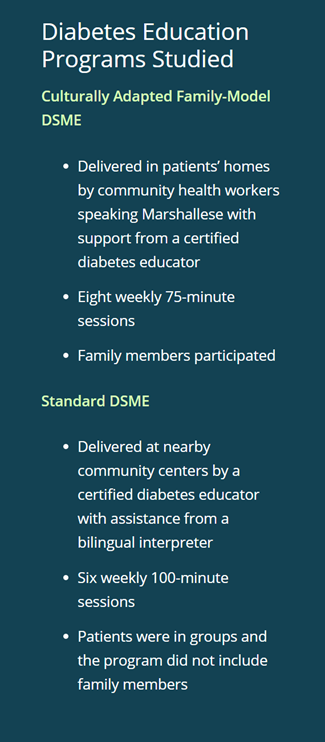New research shows tailoring diabetes education to meet cultural needs can significantly improve blood sugar levels in Marshallese people with type 2 diabetes.
By: Melissa Schenkman, MPH, MSJ
Kileti Mejbon came to the United States seeking a better life for his children. Now, they are taking care of him. The 63 year old, who hails from the Marshall Islands, retired from his job in Northwest Arkansas because of symptoms from type 2 diabetes. Doctors diagnosed him with the disease in 2010.
Before that time, he had never heard of diabetes nor did he know the symptoms. But he learned that the tingling he sometimes felt in his hands and feet was a symptom of diabetes.
So, when University of Arkansas for Medical Sciences offered type 2 diabetes education programs as part of a study funded by the Patient-Centered Outcomes Research Institute (PCORI) on improving the condition in the Marshallese community, he eagerly became a participant.
“Before the classes, when I tried walking around my house, my body was shaking, and I didn’t feel comfortable. But now, by following all the exercise and eating all the food I learned that I need to have every day, I feel better,” Mejbon said via his interpreter.
Participants in the culturally adapted family-model DSME showed significantly greater reductions in HbA1c immediately after the program and one year later
The study he participated in compared the effectiveness of a culturally adapted family-model diabetes self-management education (DSME) intervention to standard DSME in improving blood sugar management, measured by the change in hemoglobin A1c (HbA1c)—a person’s average blood sugar level over the past three months.
In the May 2019 issue of Diabetes Care, the research team reported that after comparing the two programs, participants, in the culturally adapted family-model DSME showed significantly greater reductions in HbA1c immediately after the program and one year later.
A Growing Health Disparity
Type 2 diabetes has become well-known to the Marshallese community.
In Northwest Arkansas—home to the second-largest Marshallese population in the continental United States1—health screenings found 38.4 percent of Marshallese people had HbA1c levels indicating diabetes.
By comparison, about 11 percent of adults have diabetes in all of Arkansas.2,3
Many people like Mejbon moved to the United States as part of the Compact of Free Association—an agreement allowing Marshallese people to legally live or study here on a passport and the US military to conduct activities in the Republic of the Marshall Islands.
From 1946 to 1958, the US military tested nuclear weapons on the islands, detonating the equivalent of 7,200 Hiroshima-sized bombs. The tests contaminated local food sources—predominantly fish and plants—that the Marshallese relied upon, according to the book, Bravo for the Marshallese: Regaining Control in a Post-Nuclear, Post-Colonial World.4,5
As a result, most food became imported, and rates of type 2 diabetes soared among the Marshallese people.
“The historical trauma that happened with nuclear testing created lots of distrust in research and perpetuated health disparities,” said Pearl McElfish, PhD, MBA, co-lead on the PCORI-funded study.
Letting Your Community Lead
 It’s why knowing, understanding and listening to your patient population is critical to creating successful DSME programs. Diabetes care and education specialists can accomplish this feat by applying the following lessons learned in the program McElfish, her study co-lead Peter Kohler, MD, and their team developed:
It’s why knowing, understanding and listening to your patient population is critical to creating successful DSME programs. Diabetes care and education specialists can accomplish this feat by applying the following lessons learned in the program McElfish, her study co-lead Peter Kohler, MD, and their team developed:
- Hire research staff who are members of the same community that your diabetes self-management program intends to serve. The presence of Marshallese staff members on the research team built trust between the community and the researchers.
- Incorporate your clients’ culture and beliefs into your diabetes education curriculum. The culturally tailored DSME program’s curriculum drew on key knowledge from the Marshallese community, including the use of personal stories, references to religion and commonly used analogies.
- Include people who play key roles in the client’s diet in DSME program too. Most families in the Marshallese community eat together and consume whatever food is prepared for them. If the person who is doing the cooking in the family does not understand what diabetes is or how some food their family member eats can negatively affect their health, it will be difficult for a patient from this community to improve their blood glucose management through diet, even with the best intentions.
- Provide tangible study results and keep study participants engaged beyond the end of the education program. After the study, the team provided participants with infographics containing the study’s results and their personalized results. They also hosted biannual town hall meetings where they provide study updates to the Marshallese community.
“I think the logic of including the food preparers of the household in the education program and having people on our staff who are Marshallese themselves describe it to them, provides a more effective way to transmit the information,” says Kohler, who is an endocrinologist.
View the full PCORI story with animations of the culturally adapted training and learn about the subsequent study on diabetes prevention in Marshallese adults with prediabetes here.
To learn more about PCORI and its focus on patient-centered outcomes research, visit www.pcori.org.
 About the Author
About the Author
Melissa Schenkman is a writer and editor at PCORI, a Congressionally-authorized, independent nonprofit organization that funds research to provide patients, caregivers, and clinicians with evidence-based information to make better-informed healthcare decisions. She reports, writes, and edits content for both lay and professional audiences.
She has an MPH in behavioral science and health education from the Rollins School of Public Health at Emory University, and an MSJ from the Medill School of Journalism, Media, and Integrated Marketing Communications at Northwestern University, where she received the Comer Scholarship in Health, Medical, and Environmental Reporting. She is also a recipient of a 2020 Hermes Creative Award in Web Writing/Content for her PCORI story, Thriving in School after Childhood Cancer.